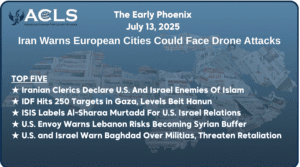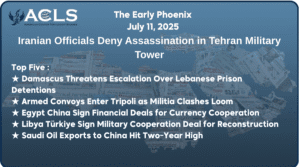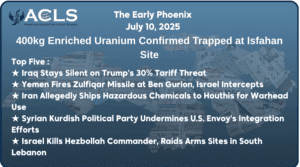Israel Agrees to Prisoner Exchange—Will Hamas Agree?
TOP HEADLINES:
- Israel Agrees to Prisoner Swap for Hostages, Awaits Hamas Response
- Gantz Threatens to Quit Israeli Cabinet if Conscription Law Passes
- Houthis Warn Saudi Arabia not to Allow US Use of Saudi Airspace
- Houthi Threat Leads Gulf States to Reevaluate Their Dependence on Russia and China for Security
- Turkish Intelligence Says ISIS-K Behind terrorist Attacks in Turkey, Iran, and Russia
=======================
★ ISRAEL & PALESTINIAN TERRITORIES
Gantz Threatens to Quit Government if Law Exempting Haredi from Military Service Passes
Benny Gantz, Israeli Minister-without-Portfolio, has declared that his National Unity Party will exit the government if a controversial haredi conscription law proposed by Prime Minister Benjamin Netanyahu passes. Labeling the law’s passage a “red line,” Gantz emphasized its unacceptability even in normal times, highlighting the societal rift it exacerbates. The proposed legislation, aiming to exempt Haredi men from mandatory military service until age 35, intensifies as the IDF faces increased demands for a larger standing army amidst ongoing conflict. The law’s advancement through the Knesset could take months, with immediate implications for military enlistment practices pending.
Israel Agrees to Prisoner Swap for Hostages, Awaits Hamas Response
In a significant development during truce negotiations in Doha, Israel has consented to release 700 to 800 Palestinian security prisoners, including 100 sentenced to life for the murder of Israelis, in exchange for 40 hostages held by Hamas in Gaza. The exchange, part of efforts to secure a six-week ceasefire potentially leading to a permanent truce, reflects mediation efforts by international actors. The proposal, doubling the initially suggested figure in Paris talks, is pending Hamas’s response. Israel’s flexibility comes amid broader negotiations aiming for a decisive resolution to the conflict, including a military strategy and humanitarian considerations.
Israel Imposes Permanent Ban on UNRWA Convoys to Northern Gaza
The United Nations Relief and Works Agency for Palestine Refugees (UNRWA) disclosed that Israel has formally notified it of a permanent ban on UNRWA food convoys entering Northern Gaza. According to UNRWA’s Commissioner-General, Philippe Lazzarini, this decision severely impedes life-saving aid amid a man-made famine situation. Despite repeated efforts, UNRWA has been unable to deliver food to Northern Gaza since January 29, highlighting a deliberate obstruction of humanitarian assistance. This move comes amid ongoing ceasefire negotiations, with Hamas insisting on UNRWA’s role in distributing aid, a stance opposed by Israel due to security concerns.
Report: Israel Sabotaged Secret Iranian Nuclear Site in 2020
An Iranian dissident media outlet has reported that in 2020, nine individuals, believed to have been recruited by an entity thought to be Israel’s Mossad, initiated a fire at an unremarkable workshop in the Tehran suburb of Shadabad. This location is suspected to be an undeclared nuclear weapons site. The Islamic Republic has allegedly concealed this act of sabotage, revealed by the independent news organization Iran International through documents acquired from hackers.
Israel Seeks Alternative Ammunition Sources Amid Tensions with the US Over Rafah Invasion
The Israeli Broadcasting Corporation reported on Monday that Israel is exploring alternative methods to procure military ammunition, citing concerns that tensions with the United States over the potential invasion of Rafah could impede military support. Despite the US being a primary supplier, Israel is looking for workaround methods to address the shortage of vital ammunition necessary for ongoing combat operations. This exploration for alternatives is in response to increased criticism and the potential impact of US-Israel tensions on military assistance, with some countries already halting weapon supplies to Israel under a “silent boycott” or legal constraints against arming nations in conflict.
=======================
★ IRAN
Land Scandal Involving Tehran’s Friday Imam Sparks Outrage
Allegations of corruption against Ayatollah Kazem Sedighi, involving the misappropriation of a $20 million land plot in Tehran, have intensified public distrust towards Iran’s leadership. Despite Sedighi’s initial denial and subsequent claims of attempting to return the plot to the seminary, public sentiment remains skeptical, viewing the act as insufficient. The scandal highlights broader concerns over systemic corruption within the regime, contrasting the severe treatment of minor offenses against the leniency shown towards high-ranking officials.
Iran Faces Housing Market Crisis
Iran’s housing sector is trapped in a cycle of stagnation and soaring prices, exacerbated by the national currency’s depreciation, inflation, and political uncertainties. Despite a nearly 40% annual inflation rate impacting construction costs and a significant currency devaluation, there’s little expectation for market recovery post-Ramadan. The average cost of housing far outstrips the average income.
=======================
★ LEBANON
Gallant Reportedly Will Seek US Approval for Israeli Escalation with Hizballah
Following a violent night including an Israeli airstrike on a building in Baalbek, tensions resumed on Sunday with an Israeli airstrike killing three individuals in the southern town of Adaisseh and another in Sawiri. Hezbollah responded by shelling an Israeli military site, with further artillery fire on the towns of Tyre Harfa and Aita al-Shaab. Israeli Defense Minister Yoav Gallant, known for his hardline stance, traveled to Washington seeking US support to expand the conflict against Hezbollah, emphasizing the aim to push Hezbollah forces away from the northern border area.
New Parliamentary Initiative to Break Presidential Deadlock in Lebanon
Independent MP Dr. Ghassan Skaff has launched a new initiative aimed at breaking the presidential deadlock in Lebanon, submitted to Maronite Patriarch Bechara Boutros al-Rahi. This initiative, building on previous efforts with some revisions, aims to gather a consensus on presidential candidates through discussions with political and spiritual leaders. It suggests submitting a list of acceptable candidates for presidency, followed by consultations to narrow the choices down. Skaff’s approach seeks a president agreed upon by all parties, avoiding candidates from specific political factions. Meetings with key political and religious figures are planned to discuss the proposal further.
=======================
★ YEMEN
UN Plans to Address Red Sea Shipwreck Crisis
The United Nations has unveiled a plan to manage the environmental disaster posed by the sinking of the “Rubimar” ship in the Red Sea, carrying 21,000 metric tons of chemical fertilizers. The plan involves a detailed technical analysis and the potential deployment of a submarine drone to assess the situation. This initiative comes amid growing concerns about the impact on the marine ecosystem, including possible extensive coral reef damage and fish populations, following the ship’s sinking off Yemen’s coast after being hit by Houthi missiles.
Houthis Warn Saudi Arabia not to Allow US Use of Saudi Airspace
Mohammed Ali al-Houthi, a senior member of Sana’a’s political council, revealed a warning sent to Saudi Arabia cautioning against allowing US air forces to use Saudi territory or airspace in attacks on Yemen. This comes against a backdrop of reduced escalation rather than a ceasefire between Sana’a and Riyadh, with humanitarian issues prioritized in talks. Al-Houthi criticized the recent US-UK military actions against Yemen, asserting Yemen’s resilience and calling for Arab solidarity with Palestine, while offering reassurances to China and Russia regarding maritime navigation safety.
Houthis Demand Arab Countries Reduce Oil Exports by Half to Force an End to Gaza War
The Houthi group in Yemen urged Arab nations to halve their oil exports to Europe and the United States as a strategic move to halt the Israeli aggression on Gaza. Mohammed Ali al-Houthi highlighted this demand as a potent action that Arab states can take to influence the cessation of the ongoing war in Gaza since October 7. Despite the US vetoing a ceasefire resolution in the UN Security Council, the Houthis claim they are expressing solidarity with Gaza by targeting ships associated with Israel in the Red Sea.
=======================
★ IRAQ
Kurdistan’s Political Strife: A Gateway for External Influence
In the Kurdistan region of Iraq, a rift between the Democratic Party and the Patriotic Union of Kurdistan has escalated, reigniting tensions and potentially weakening Kurdish political unity. This internal discord opens opportunities for increased Turkish and Iranian interventions, exploiting the situation for their respective gains. Turkey seeks economic and security advantages, leveraging its ties with the Barzani family, while the Patriotic Union’s alignment with Iraqi Shiite factions suggests Iranian influence. These dynamics not only complicate the region’s politics but also risk prioritizing external interests over Kurdish autonomy and stability.
U.S. Ambassador Says Coalition’s Work Against ISIS is Unfinished
U.S. Ambassador to Baghdad, Alina Romanowski, stated that the international coalition’s efforts against ISIS in Iraq are not yet complete, as the group continues to pose a threat. She highlighted the importance of ensuring Iraqi forces are capable of defeating ISIS, underscoring the ongoing commitment of both the United States and Iraq towards achieving a lasting defeat of the terrorist organization. This comes amid discussions for scheduling the withdrawal of coalition forces, emphasizing a future of strong bilateral security partnership between the two nations. The statements align with ongoing talks and a planned meeting between Iraqi Prime Minister Mohammed Shia al-Sudani and President Joe Biden.
Asa’ib Official Says Iraqi Prime Minister’s Visit to the U.S. Has Approval of Iraqi Clerics
Mohammad Al-Baldawi, a leader in the Asa’ib militia, confirmed that Prime Minister Mohammad Shia al-Sudani’s upcoming visit to Washington in mid-April has the approval of influential clerical figures, including the representation of the “Absent Imam” through Ayatollah Khamenei. The visit aims to discuss vital matters including enhancing Iraq-U.S. relations across trade, energy, finance, military, and security sectors. Al-Baldawi anticipates positive outcomes from the visit, highlighting the significant endorsements it has received.
=======================
★ GULF REGION
Houthi Threat Leads Gulf States to Reevaluate Their Dependence on Russia and China for Security
The agreement between Russia, China, and the Houthi rebels ensuring safe passage for their ships in the Red Sea, raises doubts about the reliability of Gulf States‘ security dependence on Moscow and Beijing. This move by China and Russia, perceived as prioritizing their own interests, comes as Gulf countries has been seeking to diversify security partnerships beyond the West.
Hyundai and Red Sea International Announce Collaboration
Hyundai Motor Group, a leading South Korean automotive manufacturer, has signed a memorandum of understanding with Saudi Arabia’s Red Sea International Company to explore future transportation solutions in Saudi tourist and resort areas. This partnership will focus on testing Hyundai’s electric and hydrogen vehicles within the Red Sea and AMAALA eco-friendly resorts, developed by Red Sea International, owned by Saudi’s Public Investment Fund. The collaboration also aims to introduce advanced aerial transportation and autonomous vehicles.
=======================
★ EGYPT AND NORTH AFRICA
Egypt to Receive 26% Increase in Natural Gas Imports from Israel by 2025
Egypt has agreed to a 26% increase in natural gas imports from Israel, raising the daily volume to 1.45 billion cubic feet by the first half of next year, up from the current 1.15 billion cubic feet. This boost follows Chevron’s completion of a 60% production increase at the Tamar field next year. Despite the wartime disruptions, Israeli gas imports have surpassed pre-Gaza war levels, helping Egypt enhance its exports and secure foreign currency. The increase is part of Egypt’s strategy to meet domestic demand and export surplus gas to Europe.
Egypt and UAE Discuss Gaza Management Post-War
During UAE President Mohammed bin Zayed’s recent visit to Cairo, discussions with Egyptian President Abdel Fattah el-Sisi focused on the situation in Gaza and post-war arrangements. Egypt is pushing for an administrative model that involves the internationally recognized Palestinian Authority, avoiding a split between Gaza and the West Bank administration. The talks come at the same time as Israeli plans to establish local governance in Gaza, excluding Hamas. Egypt opposes the Israeli proposals, fearing future complications, and stresses the inclusion of all Palestinian political factions in any arrangement for Gaza’s future administration.
EU Allocates $178 Million to Tunisia for Migration Control
The European Union plans to allocate up to €164.5 million ($177.74 million) over three years to support Tunisia’s security forces, focusing on migration control, as reported by the Financial Times. This funding is part of a broader €278 million EU expenditure on migration, with approximately two-thirds dedicated to security and border management. The package includes a training academy for the Tunisian maritime guard, implemented by the German Federal Police, and investment in surveillance and patrol equipment. Additionally, this month, the EU disbursed €150 million to assist Tunisia’s budget, aiming to stabilize its financial situation and encourage economic reforms.
=======================
★ SYRIA
ISIS Attack Kills 11 Truffle Gatherers in Syria
The Syrian Observatory for Human Rights reported the death of 11 truffle gatherers in an ISIS-claimed attack in Raqqa’s desert, a former stronghold of the extremist group. The attack also led to the abduction of three individuals. Despite security warnings and the dangers of desert areas, the high value of truffles draws many Syrians to these regions. ISIS, defeated in March 2019, continues to execute deadly attacks through its desert-based cells, particularly during the truffle season from February to April.
Security Chaos in Daraa—With Assad Regime Complicity
Daraa, a southern Syrian province, is again in the spotlight due to escalating security chaos sanctioned by the Assad regime’s security forces. Clashes erupted between the Russian-affiliated “Eighth Brigade” and the Air Force Intelligence forces led by Muhammad Imad al-Kurdi in Mseifra, ending with al-Kurdi’s forces retreating to a neighboring town. Al-Kurdi is accused of conducting assassinations and kidnappings for the regime, especially for the Air Force Intelligence, which provides his group with weapons and security clearances. Despite agreements made under Russian pressure in 2018, the regime has used local armed groups to perpetuate violence and revenge against its opponents, turning Daraa into a hotspot for murders and settling scores.
Deadly Riot in an SDF-Managed Prison in Raqqa
A riot erupted inside a security prison managed by the Syrian Democratic Forces (SDF) in Raqqa, leading to the death of at least four individuals, including two internal security forces (Asayish) members and two prisoners. The unrest was reportedly fueled by inmates’ grievances over mistreatment and demands for better conditions. The prisoners managed to seize weapons from the guards, with casualty figures potentially reaching six dead and fifteen injured. The SDF responded by recapturing the escaping inmates, imposing a security cordon around the facility, which is not the Raqqa Central Prison but a newly established detention center by the militia in the city.
Assad Regime Seeks Trade Expansion with Saudi Arabia for the First Time in 13 Years
A delegation from the Syrian Regime’s Chamber of Commerce is planning a landmark visit to Saudi Arabia on April 24, marking the first of its kind in 13 years. This visit, part of the ongoing political normalization process between Riyadh and the Assad regime, aims to bolster trade relations. Mohammad Abu Al-Huda Al-Laham, head of the Chamber, highlighted the significance of this trip for enhancing bilateral trade. The initiative follows Saudi Arabia’s decision eight months ago to allow exports to Syria, signaling a warming of relations. This development coincides with increased diplomatic exchanges and mutual visits by officials from both countries.
New Military Arrangements in Northern Syria under Turkish Supervision
Syria’s Interim Government is accelerating efforts to unify opposition factions within the “Syrian National Army” under Turkish guidance, a move which could have a significant impact on Hayat Tahrir al-Sham. Hayat Tahrir al-Sham is undergoing an internal crisis, while the interim government is seeking to establish a unified military structure in opposition-held areas. The initiative seeks to improve the security situation in Northern Syria, with the Ministry of Defense urging all independent factions to join the “Syrian National Army” to promote institutional work and enhance regional security amidst internal divisions and public protests against Hayat Tahrir al-Sham.
=======================
★ TURKIYE
Turkish Intelligence Says ISIS-K Behind terrorist Attacks in Turkey, Iran, and Russia
Investigations into a devastating attack at Crocus City Hall in Moscow reveal connections to ISIS’s Khorasan Group, linking this incident to similar attacks in Turkey and Iran. Turkish intelligence agencies have determined that the orchestrators behind the Moscow concert hall attack, which resulted in 143 civilian casualties, are from the same ISIS cell responsible for assaults on Istanbul’s Santa Maria Church and a memorial event in Kirman, Iran. This revelation highlights the Khorasan Group’s extensive operational reach, prompting increased security measures across Turkey to counter this emerging threat.
How Will the Crocus Attack Affect Russia’s Relations with Syria and Turkey?
Following the devastating Crocus terrorist attack, Russia may be moving swiftly to combat ISIS, particularly within Syria, signaling deeper military engagements in the country. Russian President Vladimir Putin has engaged in discussions with Turkish President Recep Tayyip Erdogan and Bashar al-Assad, promising enhanced anti-terrorism cooperation. Experts suggest that Russia will seek to execute more strikes against terrorist organizations across its borders, leveraging regional and international alliances.
=======================
📌 Incase you missed it,
📰 THE EARLY PHOENIX March 21, 2024
🔗 Follow the latest news from the American Center for Levant Studies via Google News



